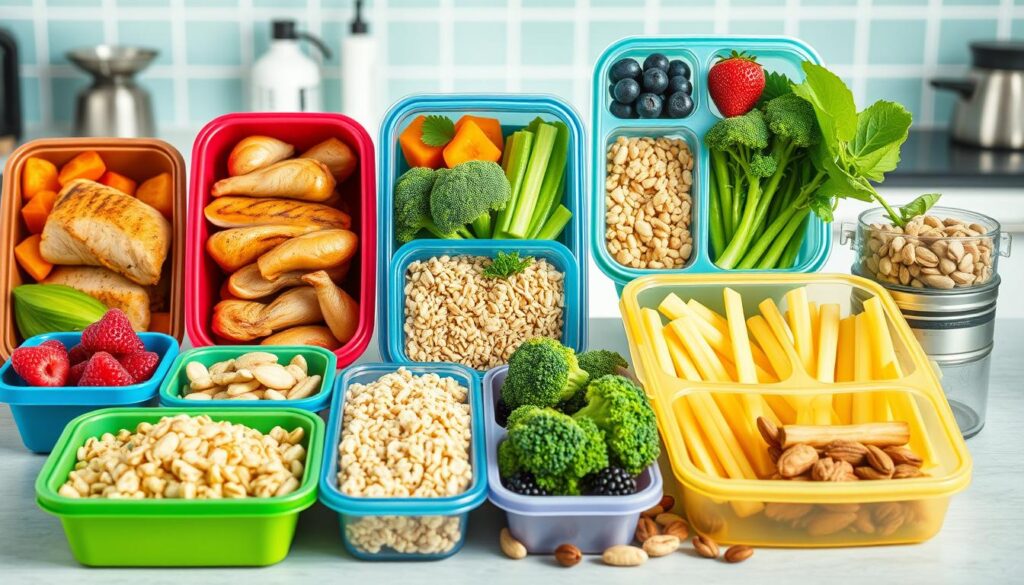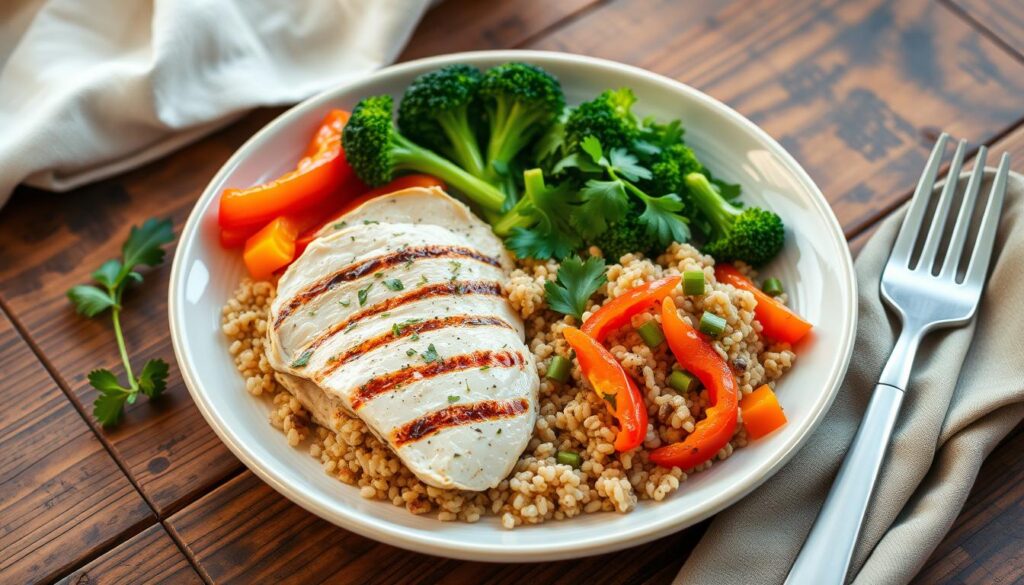Welcome to our guide on calorie deficit goals. You’ll learn how to make a meal plan, track your progress, and stay healthy. Our simple calculator will show your daily calorie needs and help you plan meals for weight loss.
A calorie deficit means you eat less than your body burns, leading to weight loss. Our calculator will figure out your daily calorie deficit. It also creates a meal plan just for you. This way, you can lose weight and stay healthy.
With our calorie deficit calculator, you can make a meal plan that’s just for you. This plan helps you lose weight and live a healthy life. Our calculator looks at your daily calorie needs and makes a meal plan that fits you.
Key Takeaways
- You can achieve your weight loss goals using a calorie deficit calculator.
- A calorie deficit meal plan helps you maintain a healthy lifestyle.
- Our calorie deficit calculator creates a personalized meal plan tailored to your needs.
- You can calculate your daily calorie deficit using our easy-to-use calculator.
- A calorie deficit meal plan helps you reach your weight loss goals.
- Our calculator helps you create a personalized calorie deficit meal plan.
Understanding Calorie Deficit Basics
To reach your weight loss goals, knowing how to create a calorie deficit is key. A calorie deficit happens when you eat fewer calories than your body uses. This leads to weight loss. It also improves insulin sensitivity, boosts fat loss, and enhances athletic performance.
The role of calorie deficit is crucial for losing weight and keeping it off. When you have a calorie deficit, your body uses stored fat for energy. This can reduce body fat and improve your health.
What Is a Calorie Deficit?
A calorie deficit means your body burns more calories than it takes in. You can achieve this by eating less or exercising more. To get a calorie deficit, cut down on daily calories or move more.
How Calorie Deficit Affects Your Body
Creating a calorie deficit changes your body in many ways. Your metabolism slows, and your body uses stored fat for energy. This can lower body fat and boost overall health. But, it’s important to do it in a healthy, lasting way.
Why Creating a Calorie Deficit Matters for Weight Loss
Creating a calorie deficit is key for losing weight. A calorie deficit diet means eating fewer calories than you burn. You can do this by eating less and moving more. A good calorie deficit meal plan helps you eat right and still lose weight.
To get the most out of your diet, track your progress. Watch your weight, body fat, and measurements often. This way, you can tweak your diet and exercise to hit your weight loss targets.
Creating a calorie deficit has many benefits:
- Weight loss: It helps you shed pounds and shape your body.
- Improved health: It lowers your risk of diseases like heart disease and diabetes.
- Increased energy: Losing weight and getting healthier can boost your energy.
By making a calorie deficit and tracking it, you’re in charge of your weight loss. Stay consistent, patient, and kind to yourself on this journey.
| Calorie Deficit Benefits | Description |
|---|---|
| Weight Loss | Achieve your weight loss goals with a calorie deficit diet |
| Improved Health | Reduce your risk of chronic diseases with a healthy calorie deficit meal plan |
| Increased Energy | Experience increased energy levels and improved overall health with a calorie deficit diet |
Using Our Calorie Deficit Calculator
To reach your weight loss goals, a reliable calorie deficit calculator is key. Our calculator gives you a plan based on your age, weight, height, and activity level. It helps you figure out your daily calorie needs and plan meals that fit your life.
Just enter your age, weight, and height into our calculator. Choose your activity level too. This tells our calculator how many calories you need each day. Then, it gives you a plan with your daily calorie needs and a suggested calorie deficit.
For effective weight loss, tailor your meal plan to your needs. Eat foods rich in nutrients like fruits, veggies, and lean proteins. Avoid foods high in sugar and fat. With our calculator and these tips, you can lose weight and stay healthy.
- Enter your details accurately for a personalized plan.
- Use our calculator often to track your progress and adjust your plan.
- Create a balanced meal plan with lots of nutrient-dense foods.
Creating Your Perfect Calorie Deficit Meal Plan
Now that you have your calorie deficit calculator results, it’s time to make a calorie deficit meal plan just for you. A good calorie deficit diet is key to reaching your weight loss goals.
Here are some important things to think about:
- balanced macronutrient distribution
- meal timing strategies
- sample meal templates
Balanced Macronutrient Distribution
A balanced diet is vital for tracking calorie deficit progress. Make sure you get the right mix of protein, carbs, and fat to help you lose weight.

Meal Timing Strategies
When you eat can affect your weight loss. Try eating smaller meals often to keep your metabolism up and support your calorie deficit diet.
| Meal | Timing | Portion Size |
|---|---|---|
| Breakfast | 7:00 am | 300 calories |
| Lunch | 12:00 pm | 400 calories |
| Dinner | 6:00 pm | 500 calories |
By following these tips and making a personalized calorie deficit meal plan, you’ll be on your way to reaching your weight loss goals. You’ll also be able to track calorie deficit progress successfully.
Common Mistakes to Avoid in Your Deficit Journey
When you’re trying to create a calorie deficit, knowing common mistakes is key. A well-thought-out calorie deficit plan is vital for losing weight. It’s important to understand how to make a calorie deficit that works for you.
Some common errors include guessing how many calories you eat and how many you burn. This can make it hard to lose weight. Also, ignoring the balance of macronutrients can lead to poor nutrition and low energy. By avoiding these mistakes, you can keep on track with your weight loss goals.
To avoid these common pitfalls, consider the following tips:
- Accurately track your calorie intake using a calorie deficit calculator
- Regularly monitor your progress and adjust your calorie deficit as needed
- Focus on balanced macronutrient distribution to ensure adequate nutrition
By being aware of these mistakes and taking steps to avoid them, you can make a successful calorie deficit plan. Always focus on a balanced and sustainable weight loss approach. If you need help, don’t hesitate to ask for guidance.
With the right mindset and a well-planned approach, you can overcome common obstacles. Understanding how to create a calorie deficit and using a reliable calculator will help you reach your weight loss goals.
Essential Nutrients to Maintain While in Deficit
When you’re on a calorie deficit diet, it’s key to keep up with essential nutrients. This supports your health and weight loss goals. A well-planned calorie deficit meal helps you do this. It also improves weight management and overall well-being.
To ensure you’re getting the necessary nutrients, consider the following:
- Protein requirements: aim for 1.6-2.2 grams of protein per kilogram of body weight to support muscle growth and maintenance.
- Vitamin and mineral needs: focus on whole foods to get essential vitamins and minerals, and consider supplements if necessary.
- Hydration guidelines: drink plenty of water throughout the day to support your calorie deficit journey.
By maintaining these essential nutrients, you can support your overall health and weight loss goals while on a calorie deficit diet. Remember to stay hydrated and listen to your body’s needs.

With a balanced calorie deficit meal plan, you can achieve your weight loss goals and enjoy the benefits of calorie deficit. Always prioritize your health and well-being, and consult with a healthcare professional if you have any concerns.
Exercise Recommendations During a Calorie Deficit
On a calorie deficit diet, exercise is key to losing weight and keeping muscle. A good calorie deficit meal plan gives you the nutrients for your workouts. Start by using a calorie deficit calculator to find out how many calories you need each day.
Cardio, strength training, and HIIT are great for losing weight. Here are some exercises to try:
- Cardio exercises like running, cycling, or swimming to burn calories and improve cardiovascular health
- Strength training exercises like weightlifting or bodyweight exercises to build muscle mass
- HIIT workouts that involve short bursts of intense exercise followed by brief periods of rest
Make sure to balance your workouts with your calorie deficit to avoid overdoing it. With a smart calorie deficit meal plan and regular exercise, you can reach your weight loss goals and boost your health.
Tracking Your Progress Effectively
To hit your weight loss targets with a calorie deficit diet, tracking your progress is key. You need to keep an eye on your tracking calorie deficit progress to stay on track. A good calorie deficit meal plan is vital for losing weight.
There are many ways to track your progress. Apps like MyFitnessPal, Lose It!, and Fitbit are popular choices. They help you log your food and track your calorie deficit progress. You can also use tools like weight, body fat percentage, and measurements to see how you’re doing.
Best Apps and Tools
- MyFitnessPal: a calorie tracking app with a large database of foods
- Lose It!: a weight loss app that tracks your daily food intake and exercise
- Fitbit: a fitness tracker that monitors your daily activity and sleep
Using these tools and methods helps you track your calorie deficit progress well. Adjust your calorie deficit meal plan as needed. Remember, losing weight with a calorie deficit diet takes time and effort. Stay consistent and patient.
![]()
Ready to elevate your experience? Explore my top 5 picks for calorie deficit categories available now on Amazon! Don’t miss out on the best deals!
5’s Pics:
- Smart Digital Food Scale for Weight Loss
- Food Journal for Weight Loss, Meal Planner
- Greater Goods Perfect Portions Nutrition Scale for Meal Planning
- Nutrition Scale by Greater Goods with Food Grade Glass
- Clever Fox Food Journal
Managing Hunger and Cravings
When you’re on a calorie deficit diet, managing hunger and cravings can be tough. Focus on eating foods that are full of nutrients. This includes protein, healthy fats, and complex carbs. A calorie deficit calculator can help you figure out how many calories you need each day.
To stay on track, consider these tips:
- Eat regular meals to keep your energy stable
- Choose healthy snacks to curb hunger between meals
- Drink plenty of water to stay hydrated
- Avoid emotional eating by finding healthy ways to deal with stress and emotions
Learning how to create a calorie deficit that fits you is key to losing weight. By making lasting changes and using a calorie deficit calculator, you can beat hunger and cravings. Always choose nutrient-rich foods and drink lots of water for your health.
Sustainable Ways to Maintain Your Deficit
To keep a calorie deficit long-term, making lasting lifestyle changes is key. This means creating a meal plan that fits your lifestyle and tastes. A good calorie deficit diet helps you lose weight and get all the nutrients you need.
Benefits of calorie deficit include better health, more energy, and clearer mind. To keep up your deficit, try these tips:
- Begin with small daily changes, like walking after meals or jumping jacks during TV breaks.
- Plan your meals ahead, including healthy snacks and portioned meals, to stick to your calorie deficit plan.
- Drink lots of water all day, and cut down on sugary drinks and fats.
By adding these habits to your daily life, you can keep your calorie deficit and reach your weight loss goals. Always talk to a healthcare expert before starting any new diet or exercise.

- Find healthier versions of your favorite foods, like baked sweet potato fries instead of regular fries.
- Ensure you get 7-9 hours of sleep each night to help control hunger and aid in weight loss.
- Keep track of your progress, including food, exercise, and weight, to stay motivated and on track.
By following these tips and making lasting lifestyle changes, you can keep your calorie deficit. This way, you can reach your weight loss goals and enjoy the benefits of calorie deficit.
Troubleshooting Common Calorie Deficit Challenges
When you’re on a calorie deficit journey, you might hit roadblocks like plateaus, hunger, and cravings. To beat these hurdles, it’s key to tweak your calorie deficit and plan out balanced calorie deficit meals. A calorie deficit calculator can guide you to the right calorie amount for your body.
Here are some tips to tackle these common issues:
- Check your calorie deficit and adjust it if you’re eating too little.
- Make sure your calorie deficit meals have the right mix of protein, healthy fats, and carbs.
- Drink lots of water to stay hydrated.
Remember, facing challenges is part of the calorie deficit path. By tweaking your calorie deficit and calorie deficit meal plan, you can keep moving forward and hit your weight loss targets. A calorie deficit calculator can help you make smart choices about your calories.
Stick to these tips and stay dedicated to your calorie deficit journey. Remember, everyone’s path is different. Be patient and flexible when adjusting your calorie deficit and calorie deficit meal plan.
| Challenge | Solution |
|---|---|
| Plateaus | Adjust calorie deficit and reassess macronutrient balance |
| Hunger and cravings | Focus on balanced calorie deficit meal plan and stay hydrated |
Conclusion: Making Your Calorie Deficit Journey Successful
Congratulations on reaching the end of our guide on calorie deficit goals! We’ve covered the basics, from the science to using our calorie deficit calculator and meal plans. Remember, staying consistent and patient is crucial.
By keeping a steady calorie deficit, you’ll lose weight and feel healthier. Stay focused on your goals. Use the strategies and tools we shared to stay on track. With the right mindset, you’ll reach your desired body and lifestyle.
Your calorie deficit journey is a long-term effort, not a quick fix. Enjoy the journey, celebrate your wins, and don’t get down about setbacks. Let’s make this a positive and lasting change. Best wishes on your path to a healthier, happier you!
FAQ
What is a calorie deficit?
A calorie deficit means you eat fewer calories than your body burns. This leads to weight loss.
How does a calorie deficit affect my body?
In a calorie deficit, your body uses fat for energy. This results in weight loss. But, it’s key to keep a balance of nutrients for health.
Why is creating a calorie deficit important for weight loss?
A calorie deficit is key for weight loss. It makes your body use fat for energy. This reduces body weight and improves body shape.
How do I use the calorie deficit calculator?
To use our calorie deficit calculator, enter your age, weight, height, and activity level. It will show your daily calorie needs and a calorie deficit range for weight loss.
How do I create a balanced calorie deficit meal plan?
For a calorie deficit meal plan, focus on balanced nutrients. Include protein, carbs, and healthy fats. We’ll give you meal templates to start.
What common mistakes should I avoid when trying to create a calorie deficit?
Avoid underestimating calories, overestimating calorie burn, and neglecting nutrient balance. We’ll share tips to help you stay on track.
What essential nutrients should I focus on while in a calorie deficit?
In a calorie deficit, focus on enough protein, vitamins, and minerals. We’ll also guide you on staying hydrated.
What type of exercise should I do during a calorie deficit?
Do cardio, strength training, and HIIT during a calorie deficit. We’ll help you balance exercise and calorie deficit to avoid overexertion.
How do I effectively track my calorie deficit progress?
Tracking progress is crucial. We’ll talk about apps, tools, and methods to measure progress and adjust your plan.
How can I manage hunger and cravings while in a calorie deficit?
Managing hunger and cravings is tough. We’ll share tips like eating protein-rich foods and staying hydrated to help.
How can I make my calorie deficit journey sustainable in the long term?
For long-term success, make lifestyle changes. We’ll offer tips on making healthy choices and staying motivated.
What are some common calorie deficit challenges, and how can I troubleshoot them?
Challenges include plateaus, hunger, and cravings. We’ll discuss strategies to overcome these, like adjusting calorie deficit and macronutrient balance.
Welcome to our guide on calorie deficit goals. You’ll learn how to make a meal plan, … Achieve Your Calorie Deficit Goals: A Simple CalculatorRead more

